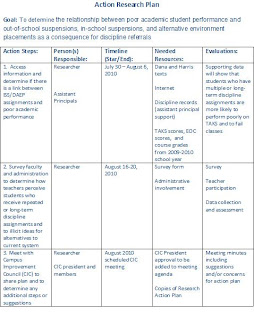In order to understand how to use and benefit from action research in education, one must first understand what it is and what it is not. Action research is research that teachers and administrators engage in on their own campus and in their own classrooms. As researchers, they pose questions such as "Will requiring a homeroom/advisory period for all high school students improve our graduation rate?" Then the teachers and administrators set about gathering data in response to their question. Once they have the data, they study it and reflect on its implications in order to propose a change in their school or classroom. The main thing to remember about action research is the word "action." As opposed to traditional research models where "outside experts" come in and conduct the research and then leave, in action research, members of the school staff are the researchers. They are the ones taking action to address an area of need. They are researching questions that they want answers for and proposing changes that they believe will address their problems. In short, they have a stake in the outcome.
The use of action research, or administrative inquiry, in education can help educators and administrators to pinpoint areas of need, collect relevant data, analyze that data, and identify potential courses of action to address the needs. According to her book,
Leading with Passion and Knowledge
(2009), Nancy Dana contends that action research in education allows teachers and administrators to pose their own questions - relevant to their own school or situation - and through studying the data gathered when answering that question, propose and institute changes that are specific their circumstances. Also, because educators are the ones conducting the inquiry, they are more likely to see the need for and benefits of any changes. They have ownership in the problem, the solution, and the ultimate outcome.


